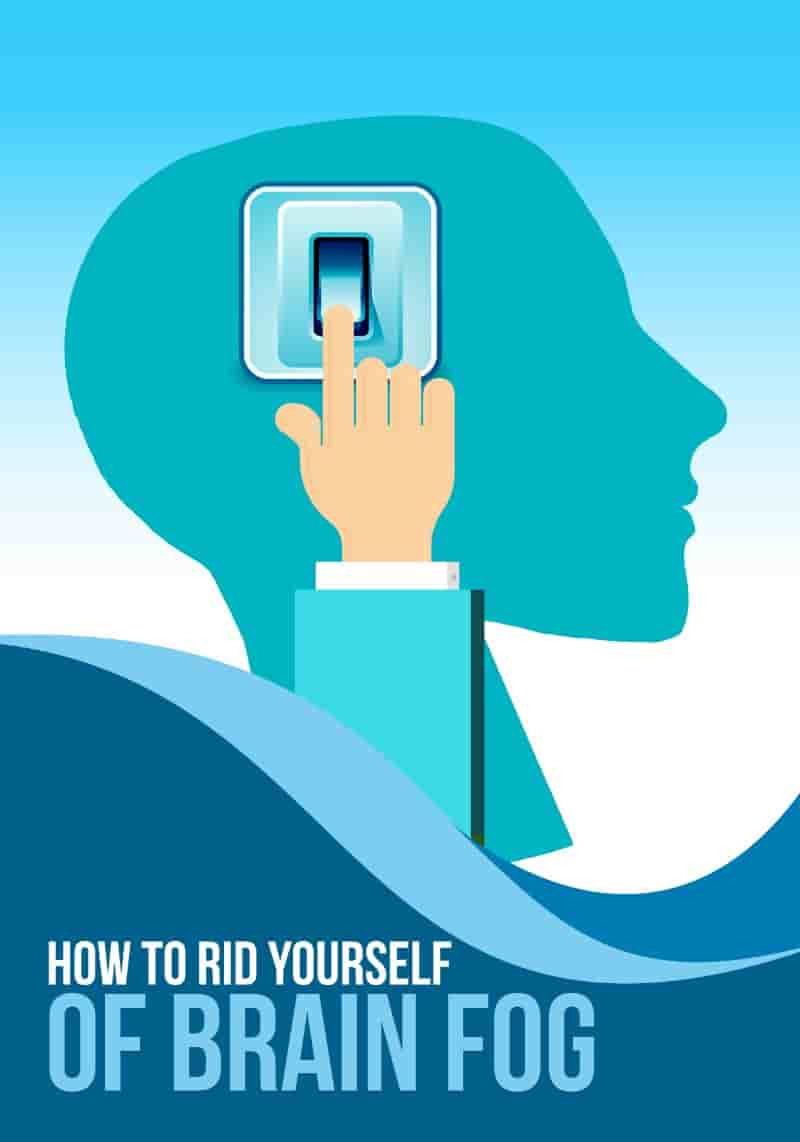Don’t let your mind go blank while you are still talking or thinking – Wake up and get rid of brain fog
If you are wondering what brain fog is, it’s basically just the opposite of when you feel calm, optimistic, level-headed and motivated. It’s understandable why it can rob one of happiness and inspiration, increasing the likelihood of depression and anxiety. Even the medical fraternity has not recognized this ‘condition’ as a real, specific health condition – in medical literature; brain fog is usually described as a ‘mild cognitive impairment’. And coffee doesn’t help!
Brain fog, or foggy head, keeps your thoughts illusive, not able to comprehend or recall anything. Your memory fails, normal intellectual type of jobs are hard to do, and so on. And it can come and go too, occurring frequently or even persisting indefinitely; even following an escalation of other symptoms and sensations of anxiety. It can be slight, it can be intense, even severe, coming in waves where it might be strong in one instance but ease off in the next.
There are many medical conditions that could be the reason for brain fog, so it’s a good idea to discuss your symptoms with your doctor. If your doctor says that your brain fog is because you are anxious and there is no medical cause to contend with, that’s a relief. These diseases or conditions are associated with brain fog:
- Chronic fatigue syndrome
- Dementia
- Fibromyalgia
- Anemia
- Diabetes
- Sjögren syndrome
- Migraine
- Alzheimer’s disease
- Autoimmune diseases like arthritis, lupus, and multiple sclerosis
- Lyme Disease
- Tick Bite Fever
- Celiac Disease, and other

some reasons why you suffer from brain fog
Stress
❖ Active stress responses suppress the rationalizing areas of our brains, increasing the brains reaction to danger. When this change occurs in the brain functioning, it makes us more aware of the danger and increases our reaction to it. Sometimes the stress response gets activated too often or too dramatically – then the stress hormones will cause an increase in the electrical activity in the brain. Increased electrical activity in the brain generates an increase in our thoughts, causing our attention to be easily side-tracked into foggy thoughts.

❖ The more stressful we are, the more persistent our brain fog is. Our responses to stress can suppress the memory and learning areas of our brain, making it more difficult for our brain to store information.
❖ When our stress levels are elevated, our bodies are taxed; we are tired out and drained, unable to function normally or to retrieve information. Studies show that the brain becomes tired quicker than other parts of the body. An exhausted brain loses its ability to think, to remember things, to reason quicker than what our body gets tried.
❖ It is obvious to see from the above, just how stress plays a major role in brain fog, and how it can negatively affect short-term memory and concentration. People who experience entrenched anxiety usually have the habit of being internally focused; they worry about what others think; they are easily distractible because they are so busy thinking of all the ‘what-ifs’ in their life. They often become obsessed about it to the point that a lot in their life has to take a back seat and that includes their attention and their focus on the external things.
❖ When these concentration and short-term memory problems occur, a lot of people start wondering if they are ‘losing it’; they believe they could be on the verge of a mental breakdown. Worrying about it just adds even more stress onto the over-stress-stimulated body.
❖ When active stress responses are the cause for brain fog, you need to calm yourself down and contain the anxious behavior, bringing an end to hectic and active stress responses. Definitely easier said than done! But in all likeliness, it will be the end to your brain fog.
❖ You can feel comforted knowing that brain fog can completely disappear when your body’s stress has returned to its healthy levels. Putting it simply, brain fog is a typical indication that your body is overly stressed – it’s nothing more really. But eliminating your over stressed state is important, and unfortunately, there aren’t really any quick fixes either. It means eliminating the active stress responses of your body.
Unfortunately, some doctors prescribe Ritalin and Adderall to treat brain fog, but these can help for a while, and can make matters worse in the long run. Thing is, brain fog is pretty much related to diet and most people know that diets affect their health; in fact, most people would be surprised just how much diet comes into play in a lot of medical conditions.

More causes that can cause brain fog
Fatigue
❖ When you are exhausted, this really impacts big time on your brain functioning optimally. All states of stress rob you of getting enough quality sleep and too few hours of sleep can have a negative impact on your brain cortical levels.
Blood sugar imbalances
❖ Your brain relies on glucose in the blood to help it function properly; to keep your focus and memory intact and functioning well too.
❖ When your blood sugar is low, it’s like an alarm system for your brain, and when you skip meals, particularly breakfast and even lunch, you are causing low blood sugar. The craving for sugar kicks in and when you succumb, you are causing toxic inflation which affects brain health. If you want your brain to be sharp all day, start with a healthy breakfast which includes high protein foods and fats. For example, a good breakfast type would be egg cooked up in some olive oil with some avocado as well.
Depression and anxiety

❖ Who wants depression and anxiety? No way! And yet the way we eat, the way we live our lives can bring on these two unwanted health conditions. Depression flattens out brain signaling because the nerve cells are affected and no longer fire on all cylinders.
❖ Depression and anxiety impact on our ability to focus, to remember and to be mentally sharp. There are a lot of reasons for depression and anxiety to occur and they include trauma, life situations, inflammation, changes in your gut microbiome, nutritional deficiencies, dairy intolerance and much more – one needs to address all these root causes.
Disruptions in your microbiome
❖ When there is a disruption in your gut microbiome, such as candida (a naturally occurring yeast) overgrowth, for example, it brings on anxiety, fatigue (as mentioned above), and depression, which can lead to you being in a state of low-level intoxication; similar to that of drinking too much alcohol. Your memory, focusing, and concentration powers are affected negatively. Your microbiome can become disrupted because of your diet, stress, and use of antibiotics, leaky gut, and other imbalances in the gut. It is vital that you restore your microbiome health if you are experiencing brain fog. This will require a diet-reboot where it is recommended that you start taking in fermented foods such as sauerkraut, kimchi, organic yogurt, kefir, as well as probiotics.
Brain-inflammation
❖ No, it’s not a made-up term! It’s real and it’s a phenomenon occurring when components of your immune system and chemicals cause inflammation in the circulation of the body. The inflammation crosses over your blood-brain barrier (BBB), causing inflammation in the brain.

❖ ‘Brain-inflammation’ is associated with depression, anxiety, brain fog, and worse, dementia, occurring as a result of anything that causes inflammation.
❖ The first thing you have to do is to find the root cause of the inflammation, removing those foods that trigger inflammation. These could be gluten, grains/flour products, and dairy, grain-fed meat, for example.

❖ A full medical examination should be undertaken too, to assess other causes of ‘brain-inflammation’ such as autoimmune diseases, diabetes, chronic fatigue syndrome, nutritional deficiencies, hypothyroidism, and other infections or viruses which can cause brain fog and ‘brain-inflammation’.
Insufficient nutrients
❖ It is imperative to feed the brain by taking in nutrients that the brain requires for it to function properly – to avoid inflammation as mentioned above. Top nutrients that nourish the brain are proteins, the building blocks of keeping our brain functioning optimally.
❖ It’s also about the right fats from walnuts, salmon, avocados, pecans, virgin olive oil, and coconut oil. These form the basis of healthy cells, including the nerve cells.
❖ Don’t ever skimp on the dark green veggies and the dark berries too. In fact, the brain requires plenty of the B-vitamins to function properly – a low B12 will have you suffering from cognitive problems. Low iron levels also cause brain fog. Studies reveal that when you eat high protein meals with plenty of natural iron sources, you improve your brain function in a matter of a mere 4 months.
Hormonal imbalances
❖ When our hormones are imbalanced, we can expect to notice changes in our brain function. Hormonal imbalances definitely challenge our mental clarity, amplifying brain fog. If you experience symptoms and conditions that might cause you to believe you have a hormonal imbalance, you need to repair it.
Thyroid and Adrenal Imbalances
❖ An important function of the thyroid is to take care of brain health. Hypothyroidism (an under-active thyroid) impacts on your cognitive functioning to the point that it can cause memory and focusing problems; over time it can go so far as to cause dementia.
Medication Side Effects
❖ There are some medications, particularly antihistamines, anti-anxiety medications, blood pressure lowering medications, medications for urinary incontinence, some sleep and pain medications, even some antibiotics that can bring on brain fog and affect the memory.
❖ If you are taking a new medication and have noticed that your mental clarity has changed or taken a dip, you should speak with your doctor.
Dehydration

❖ Did you know that water makes up 73% of your brain? That means that even mild dehydration can cause an imbalance in your body. You might have noticed how runners and marathon runners sometimes seem disorientated and confused at the finish of a big race.
❖ Studies show that just being 2% dehydrated can affect your mental performance. Mild dehydration can change your alertness, your concentration, your short-term memory, and your perception
Sedentary lifestyle
❖ You need to exercise, no matter what your age, no matter what ailment you have, and that includes brain fog. Getting regular aerobic exercise; the type of exercise that gets your heart pumping and causes you to work up a bit of sweat; this is what boosts the parts of your brain involved in memory, thinking, and learning.

❖ Researchers have also found that people who spend many hours sitting, parts of their brain became ‘thinned’. It is because sitting decreases and restricts movement of the blood flow throughout the body. That means oxygen to the brain is also restricted as well as stimulation of the hormones that are responsible for the formation and growth of new brain cells.
❖ Exercises burn up cortisol and releases endorphins, the happy hormones, combating brain fog, reducing inflammation, counteracting stress and anxiety.
It affects everyone, irrespective of age
While brain fog might be a natural reaction to certain circumstances, it’s not normal to have brain fog in your 20s – neither is it normal to have it in your 60s and your 70s, and beyond. It’s not a sign of old age. It’s a sign that there is something affecting your brain. If you have optimal health, you should age with all your cognitive functions intact. Of course our brains age, but if we keep them nourished and supple, we should not experience brain fog or any cognitive decline. Our bodies tell us a lot – so when we have symptoms, it’s our bodies telling us that something needs to shift – that might mean making changes in our diet or our lifestyle, our environment or our self-care.
Do you need to see a doctor with brain fog?
You need to see your doctor if your brain fog doesn’t improve because it might signal any of the above underlying issues and your doctor will perform a physical examination. He will find out about your mental health, diet, physical health, current medications, etc. Let your doctor know all the symptoms so he can diagnose why you are experiencing brain fog. Blood tests will also reveal much to your doctor and he will base the results on whether to investigate further or not. Any noticeable changes in your cognitive functioning or if you have had an infection with a fever and have experienced cognitive changes, you need to see your doctor. He will give you a proper neurological examination and set your mind at rest. The thing is, one shouldn’t ignore brain fog, because it’s your body talking to you, saying “pay attention to me – I’m talking!” You need to listen out, because dementia is a real, escalating health problem today. Don’t just accept your brain fog as tiredness or old age, and then just move on. Address the root cause so that you can hastily restore your clarity, focus, and memory. If not treated adequately, brain fog affects the quality of your life. Imagine being at work and you forget to send crucial files to a major client? Or you forget to turn the oven off? Or you forget one of your children’s birthdays? To kick start your ‘resolve’ to get rid of brain fog, here are some powerful brain supplement to clear the fog so you can see the light:
Adaptogens: Maca, holy basil, and ashwagandha are examples. They help to lower your cortisol levels, helping your body fight stress and fatigue.

Omega-3 fish oils help to lower inflammation, supporting brain health.
Magnesium is one of the most important minerals for your body; being involved in over 350 biochemical reactions in the body, including transmission between neurons. For brain fog, it is recommended as an excellent supplement, helping to improve sleep as well and to relieve depression.
Acetylcholine, or Ach, is a vital neurotransmitter and research shows a lack of this possibly bringing on cognitive decline.
Choline: The body needs choline to manufacture Ach. Your brain fog could be due to the fact that you don’t have this essential vitamin in your diet. A deficiency will definitely impact on your body and mind.
Folate or folic acid is another essential supplement for brain function because a deficiency can cause cognitive impairment. Supplement your diet with folic acid or combine it with other B vitamins to improve your mental function.
Rhodiola Rosea is a wonderful herb straight from Mother Nature herself; an adaptogenic herb, promoting balance in the body. It also combats mental fatigue, improving energy. Rhodiola has been used mostly to counter physical and boosting cognitive function.
Phosphatidylserine, or PS, is a phospholipid, supporting cell membranes. It improves communication between your cells and supports the growth and maintenance of neurons, improving symptoms of brain fog.
Essential oils that are known to help with brain fog are lavender, frankincense, lemon, peppermint, and others. The most effective oils are the therapeutic-grades with pure ingredients.
The conclusion is that there are solutions!

Brain fog has become an undesired side-effect of our fast-paced, industrialized lifestyle. Many of the convenient, processed foods and factory-farmed meat that we eat do not support brain health. It cannot be emphasized enough the importance of a healthy diet. If you want to get good results for any health condition, you have to be very careful what you put in. When you provide your body with the right micro-nutrients by avoiding sugar, refined carbs, and all that processed food, you are doing your body and brain one big favor. You are giving it oxygen and life!
Stress is a major promoter of all things bad in the body – you need to manage it by getting in healthy exercises, doing fun activities that help you relax, socializing with positive and upbeat friends, practicing mindfulness, and not forgetting there are wonderful counselors whom you can talk to as well. These are medical professionals, who specialize in cognitive symptoms; who can teach you ways of working around them. These professionals can be neuropsychologists, vocational counselors, cognitive therapists, and even occupational therapists.
When you lie with cognitive dysfunction such as brain fog, you can lose your self-confidence and your self-esteem, because so often depression and anxiety affect your daily life activities. You can learn to cope and fight brain fog with the right weapons, such as mentioned above. Be kind to yourself as you find your own personal solutions and take the necessary action to arrive at your own personal solution. It can be pretty challenging but you will see how worthwhile it was when you see how great you feel! There are wonderful natural remedies and solutions out there that you can start working on today – all are aimed at seeing that you thoroughly treat and beat brain fog!

